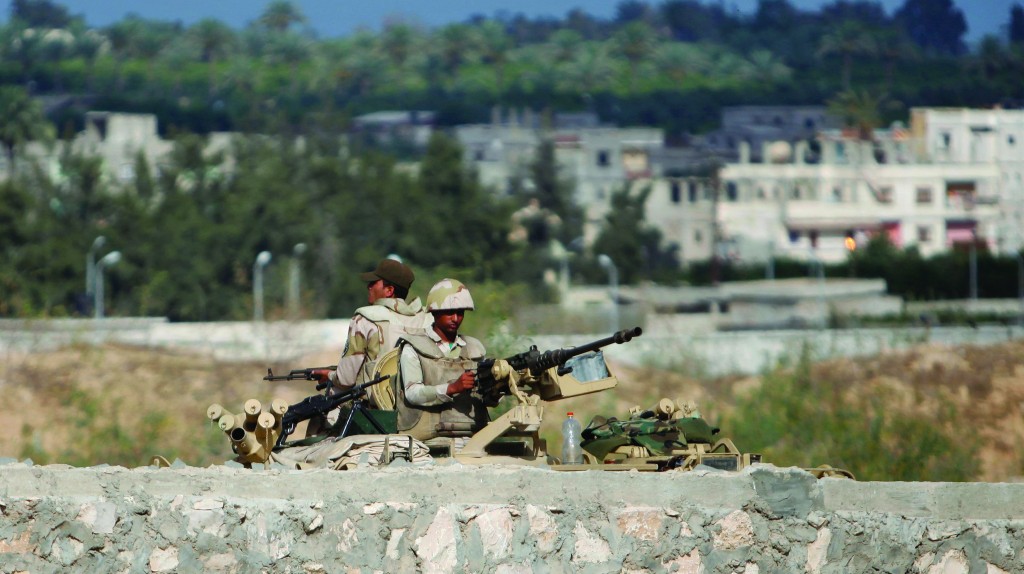Hamas Reeling From Egyptian Upheaval

The ouster of Egyptian President Mohammed Morsi has delivered a sharp jolt to Gaza’s Hamas rulers, robbing them of their most important ally and raising difficult questions about the future of radical Islam in the region.
On Friday, Hamas Prime Minister Ismail Haniyeh said he is “monitoring developments” in Gaza’s larger neighbor and is hopeful relations will endure despite the crisis.
Earlier in the day, Egypt shut its border crossing with the territory, citing security concerns after suspected Islamic terrorists attacked four sites in the northern Sinai Peninsula. One soldier was killed and three were wounded. Some 200 Palestinians were turned back to Gaza after the order.
Jittery Hamas officials in Gaza have otherwise been quiet as they try to adjust to the new reality. But it appeared likely that after making important gains over the past year, their group will see its regional standing weakened, at least in the short term. The rival Palestinian movement Fatah, which lost control of Gaza to Hamas six years ago, welcomed the changes in Egypt.
The streets of Gaza were quiet on Thursday, a vivid contrast to the wild celebrations that erupted just a year ago when Morsi won Egypt’s first democratic election.
Morsi and Hamas both come from the pan-Arab Muslim Brotherhood movement, and his victory was seen as a ringing endorsement of the group’s Islamist ideology. Morsi quickly ushered in an era of new relations with Hamas after years of strained ties with his predecessor, the longtime Egyptian ruler Hosni Mubarak.
While Mubarak limited contact with Hamas to security matters along the border, Morsi gave Hamas rulers VIP treatment. They were permitted to travel freely across the Egyptian border and were welcomed in Cairo as legitimate political rulers.
Morsi also eased some general restrictions on travel in and out of Gaza. But not everything that Morsi did was to Hamas’s liking. He carefully preserved Egypt’s 1979 peace treaty with Israel. And in recent weeks, Egyptian forces have cracked down on the smuggling tunnels to contain terrorist groups operating in the area. The crackdown has resulted in shortages of certain key goods, including fuel and cement.
Nonetheless, Morsi, as leader of the Arab world’s largest and most powerful nation, was widely seen as a friend to Gaza and an important symbol of hope that Islamist groups would spread their influence across the region in the wake of the Arab Spring uprisings.
Fatah officials did little to conceal their happiness over the Muslim Brotherhood’s failure in Egypt, and even expressed hope that it would lead to a collapse of the Hamas government as well.
“We salute the Egyptian people who have expressed their will,” said Tawfiq Tirawi, a senior Fatah official.
Meanwhile, the Egyptian army denied a report that curfews had been imposed in two North Sinai towns on the border with Israel and the Gaza Strip on Friday.
“Nothing has been issued,” an army spokesman said when asked about the report that a curfew had been imposed in the towns of Sheikh Zuweid and Rafah.
This article appeared in print on page 1 of edition of Hamodia.
To Read The Full Story
Are you already a subscriber?
Click "Sign In" to log in!

Become a Web Subscriber
Click “Subscribe” below to begin the process of becoming a new subscriber.

Become a Print + Web Subscriber
Click “Subscribe” below to begin the process of becoming a new subscriber.

Renew Print + Web Subscription
Click “Renew Subscription” below to begin the process of renewing your subscription.








